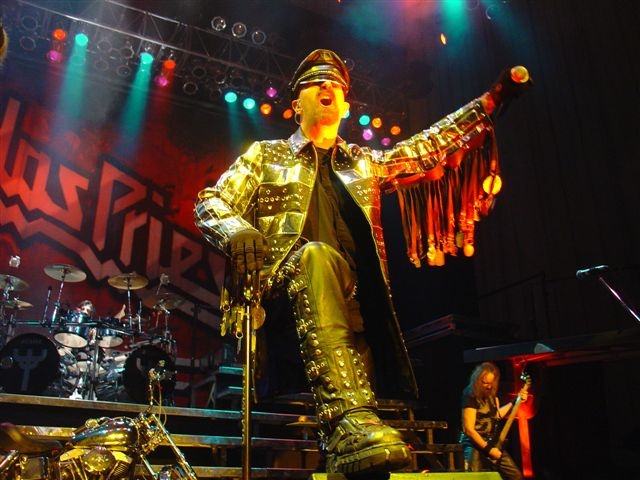David Bowie didn’t personify metal in the sense of an Ozzy or a Lemmy or a Ronnie James Dio. The Man Who Sold the World dabbled with heavy psychedelia, but he never really put out a proper “metal” album. The glitter and glam he’s most known for seem antithetical to metal’s muted palette and dark sensibilities. Without him, however, the genre as we know it wouldn’t exist.
Bowie wasn’t a musician. Well, he was – and a brilliant one at that – but his lasting contribution, the one that changed the music world forever, lay in his mastery of image. No; Image. Sound and vision. The art of creating a coherent identity, from the clothes to the album artwork to the music itself. He pioneered rock ‘n roll as ever-evolving theater production. Especially during his early 70s glam phase, his flamboyant costumes and face paint made him a pop culture icon.
Videos by VICE
 Photo via i-D
Photo via i-D
Ziggy Stardust. Aladdin Sane. Whatever the hell he’s supposed to be on the cover of Diamond Dogs. Each persona had a look, a history, a different apocalyptic science fiction world to live in. He put himself front and center, makeup smeared all over his album covers. It was unprecedented at the time (and still pretty weird, even now), and he smashed down all kinds of doors and barriers.
What does that have to do with heavy metal? More than most offshoots of rock, it revolves around image. The very mention of the word conjures a very specific aesthetic: Denim and leather. Demons. Corpsepaint. Gauntlets covered with spikes. Blood and fire. Long hair and cod pieces and leather boots. Some of its most famous (or notorious) practitioners slather themselves in greasepaint, or put on monster masks and create characters for themselves with names like “King Diamond” or “Shagrath” or “Oderus Urungus.” Hell, look at KISS.

Photo courtesy of KISS

Photo courtesy of KISS
If you consider hair metal to be proper metal, the most commercially successful iteration of the genre featured guys wearing garish makeup and clothing traditionally associated with women. You don’t listen to metal because you think you fit in with the mundanes. It’s a scene created by, and for, people who feel like freaks and weirdos and outsiders.
Bowie was the patron saint of outsiders.
Image via Motley.com
It didn’t matter that the image Bowie projected was a polymorphous, androgynous, pansexual alien. He blazed the trail. His fearlessness made it safe for Judas Priest’s Rob Halford to walk out on stage in S&M gear. There’s no way the Sunset Strip dudes would’ve put on makeup and fishnets if Bowie hadn’t done it first. Hell, you can trace a straight line from the cover of 1973’s Aladdin Sane to the front of black metal legend Abbath’s solo debut this year.

Photo courtesy of Judas Priest

Photo courtesy of Judas Priest
His presence can be felt everywhere across the entire history of the music. Bands as diverse as Brooklyn post-metal outfit Tombs, German power metal goofballs Helloween, and Polish death metal titans Behemoth have covered his songs. The artwork for Glenn Danzig’s recent covers album, Skeletons, plays off of Bowie’s Pinups. Even Iron Maiden’s mascot Eddie, as unglamorous a figure as one could imagine, took cues from the Thin White Duke, slipping from role to role on successive albums.

Image via ironmaiden.com
Image via ironmaiden.com
The crazy thing? Bowie had this much influence without even trying.
He was a figure who tested the limits of what was acceptable in a pop-culture space. Extremity isn’t just a matter of playing fast and singing about evisceration. Extremity means breaking through barriers, challenging taboos, and pushing back against traditional social mores. Even though Bowie was extreme in a different way than metal acts, by expanding the definition of what was acceptable, he made it possible for everyone that followed in his path—and since metal is a genre of extremes, it benefited immensely. He allowed young bands in the genre to spread their wings and really embrace the outlandishness that has become part and parcel of the metal experience.
It’s hard to understate the importance of an artist who had this much influence on a genre he wasn’t even a conscious part of. He opened doors in more obvious ways—he was obviously a huge icon for queer culture – but it really says something about his accomplishments that he left such an indelible mark on something he was only tangentially connected to.
Horns up to you, Mr. Bowie.
Jeff Treppel is blasting Krautrock from hell on Twitter.




